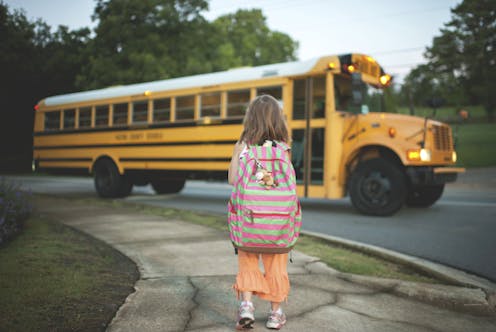How parents can help kids deal with back-to-school anxiety
- Written by Elizabeth Englander, Professor of Psychology, Bridgewater State University

As a child, I had a great deal of anxiety. If you’ve ever seen me speak in public, that might surprise you. But anxiety among children is extremely common and affects almost all children, to varying degrees.
During pre-pandemic times, researchers noted that as many as 7% of children had a diagnosable anxiety disorder[1] that disrupted their everyday functioning. In addition, 20% had a tendency to feel anxious[2] that didn’t rise to the level of a clinical disorder. And all children feel anxious at some time or another.
As a researcher[3] who’s studied children’s mental health for decades, I know that predictability helps prevent anxiety[4] in children. Predictability means things going along as they’ve always gone: sleep at night, up in the morning, cornflakes for breakfast, off to school, activities in the afternoon, dinner with the family. In Louise Fitzhugh’s children’s novel “Harriet the Spy,” Harriet’s mother can’t believe that her daughter always takes a tomato sandwich to school. Always. Harriet has no interest in variety. She’s perfectly happy with the same sandwich, year after year.
Given children’s fondness for sameness and predictability, it should be no surprise that a global pandemic that halted school as kids know it, slammed the brakes on seeing friends, stopped extracurricular activities and banished all but immediate family members would have a profound impact on children’s anxiety.
A to-be-published study I conducted on 238 teens between January and May 2021 at the Massachusetts Aggression Reduction Center[5] found that an astonishing 64% reported increased anxiety over the course of the pandemic. Even back in the spring of 2020, researchers were finding increased levels of anxiety among children in China[6]. Similarly, a large-scale survey[7] by the nonprofit Save the Children found significant increases in negative emotions including anxiety, in 48 countries around the globe.
To whatever extent the delta variant[8] affects in-person instruction in the fall of 2021, back-to-school this year will be different from pre-pandemic years. Anxiety may be a challenge for many more children than usual, and it can be intertwined with other feelings, such as excitement and shyness.
Here are steps parents can take to help reduce their kids’ back-to-school anxiety and encourage a better start to the fall term.
Ask your kids how they’re feeling about going back to school, and keep an eye out for headaches, stomachaches, sleeping troubles, persistent “what if” questions, crankiness, excessive concern about very distant events, problems focusing on schoolwork and persistent concerns that aren’t alleviated by logical explanations. An example of this might be worrying that there has been no progress in fighting the pandemic, despite widespread information about the development of effective vaccines and better treatments.
What’s tricky, of course, is that any of these can potentially be an indication of many different problems, so take a second step. Talking to your kids about their thoughts may help you unravel whether they’re feeling anxious.
2. Encourage activities that reduce anxiety
Playing outside, playing with friends or even just “hanging out” can be powerful ways to reduce negative feelings[9]. Outdoors, people often feel more relaxed[10] – the antithesis of anxiety. Playing in an unstructured way[11] – that is, without someone else telling them what or how to play – allows kids to work through their feelings successfully and reduce anxiety.
3. Help your kids understand the pandemic
Look for books and activities that can educate kids about the pandemic and post-pandemic life to help them feel like they understand what is happening around them. Children may not understand what a vaccine is, for example, and how it can protect against disease. People who know more about cataclysmic events or relevant facts typically feel less helpless[12], and children are no exception. There are several age-appropriate books that use pictures and humor to explain to kids what is happening.
4. Focus on family activities
The emotional connection that children have with their families is their psychological anchor[13] during difficult times. At a time when so much of everyday life has changed, spending time with family can be an antidote for uncertainty[14]. Take a walk or a hike together, eat dinner together, play board games.
5. Embrace distraction
Distraction isn’t a cure for anxiety, but it can diminish its intensity[15] and help sufferers think more clearly about the source of their worries. When children are feeling very anxious, it’s fine to talk to them about how watching an engaging program, or reading a funny book, can help them feel calmer.
6. Get professional help when needed
If your child’s anxiety is interfering with sleep, eating, socializing or school attendance, and it persists beyond a few days, it’s a good idea to call your pediatrician or family doctor and report what’s going on. Medical professionals who work with children are seeing anxiety skyrocket[16] among kids, and they know how to get your child the necessary help.
As with any back-to-school season, you may find yourself shopping for binders and backpacks. This year in particular, though, children and their anxiety may need more of a focus. Practicing simple prevention and intervening when necessary can get your kids off to a great school year.
[The Conversation’s newsletter explains what’s going on with the coronavirus pandemic. Subscribe now[17].]
References
- ^ 7% of children had a diagnosable anxiety disorder (www.cdc.gov)
- ^ 20% had a tendency to feel anxious (www.psychologytoday.com)
- ^ researcher (scholar.google.com)
- ^ helps prevent anxiety (doi.org)
- ^ Massachusetts Aggression Reduction Center (www.marccenter.org)
- ^ children in China (www.doi.org)
- ^ large-scale survey (www.savethechildren.org)
- ^ delta variant (www.cdc.gov)
- ^ reduce negative feelings (doi.org)
- ^ people often feel more relaxed (doi.org)
- ^ Playing in an unstructured way (doi.org)
- ^ less helpless (www.doi.org)
- ^ psychological anchor (www.doi.org)
- ^ antidote for uncertainty (doi.org)
- ^ diminish its intensity (www.doi.org)
- ^ seeing anxiety skyrocket (www.localdvm.com)
- ^ Subscribe now (theconversation.com)
Read more https://theconversation.com/how-parents-can-help-kids-deal-with-back-to-school-anxiety-165273
















